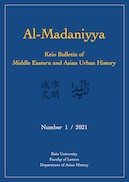Al-Madaniyya
Since the turn of the twenty-first century, humanity has faced more severe realities and critical problems, so fewer people may have brilliant dreams regarding cities. Although idealizing a primitive hunter-gatherer life and a self-sufficient agrarian society in the distance past is understandable, we should not abandon the question of what makes a city ideal and how to achieve such features. The history of cities in the Middle East and Asia before and after modern times contains countless positive and negative clues that can help us to envision better cities of the future.
This scholarly electronic bulletin, Al-Madaniyya: Keio Bulletin of Middle Eastern and Asian Urban History attempts to shed new light on the history of politics, economy, society, culture, and thought in the cities of Islamicate civilization centered on the Middle East and of Asian civilizations centered on China. While we aim to widely publish original research findings on urban history, our bulletin is somewhat restricted in nature. The contributors of the articles written in English, Chinese, and Middle Eastern languages here are researchers who have had experience either giving lectures or studying at the Department of Asian History, Faculty of Letters, Keio University, which places particular emphasis on urban history studies in the Asia and Middle East.
In publishing this bulletin, we are receiving support from designated donations for the purpose of developing historical research on the Islamicate world on Mita Campus of our university.
Opinion expressed in Al-Madaniyya are solely those of their authors, and do not necessarily reflect the opinions or judgements of the Department of Asian History, Faculty of Letters, Keio University.
Read more
This scholarly electronic bulletin, Al-Madaniyya: Keio Bulletin of Middle Eastern and Asian Urban History attempts to shed new light on the history of politics, economy, society, culture, and thought in the cities of Islamicate civilization centered on the Middle East and of Asian civilizations centered on China. While we aim to widely publish original research findings on urban history, our bulletin is somewhat restricted in nature. The contributors of the articles written in English, Chinese, and Middle Eastern languages here are researchers who have had experience either giving lectures or studying at the Department of Asian History, Faculty of Letters, Keio University, which places particular emphasis on urban history studies in the Asia and Middle East.
In publishing this bulletin, we are receiving support from designated donations for the purpose of developing historical research on the Islamicate world on Mita Campus of our university.
Opinion expressed in Al-Madaniyya are solely those of their authors, and do not necessarily reflect the opinions or judgements of the Department of Asian History, Faculty of Letters, Keio University.
18 registered articles
(updated on June 19, 2025)
(updated on June 19, 2025)
Online ISSN : 2436-0678
RESEARCH REPORT / TECHNICAL REPORT
PEER REVIEWED
FREE ACCESS
